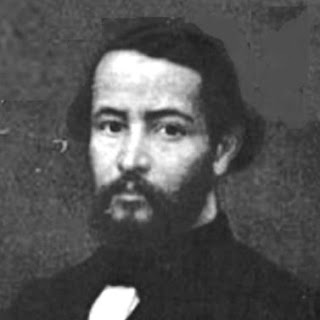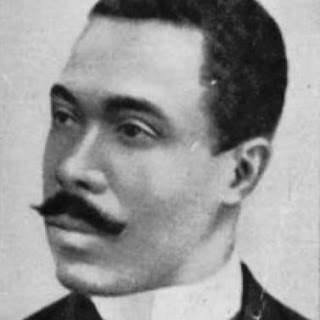Biography.
João da Cruz e Sousa (24 November 1861 – 19 March 1898) was a Brazilian poet and journalist, famous for being one of the first Brazilian Symbolist poets ever. A descendant of African slaves, he has received the epithets of "Black Dante" and "Black Swan". He is the patron of the 15th chair of the Academia Catarinense de Letras.
Antiphony
Oh pale, white Forms, clear Forms
of moonlight, snow, and mist!...
Oh vague, fluid, translucent Forms...
Incense burning on altars...
Forms set with pure, bright lights
of the love of Virgins and vaporous Saints...
Wandering brilliances, drenched coolnesses
and sorrows of lilies and of roses...
Indescribable music from heaven,
harmonies of Color and of Fragrance...
Sunset's hesitant last moments,
Requiem for the Sun in Light's Pain...
Visions, psalms and peaceful hymns,
muffled sounds of organs, sobbing...
Suspension of sensual malices
morbid, ecstatíc, subtle and soothing...
Infinite spirits, scattered,
inexpressible, Edenic, ethereal,
fertilize the Mystery of these verses
with the ideal flame of all mysteries.
Let the Dream's bluest gauzes
be bright let the Stanza be exalted
and let the emotions, the chastities
of the soul of Verse, sing in these verses.
Let the gold pollen of the finest stars
fill and inflame the rhyme with clear passion...
Let the purification of alabasters glisten
sonorously, luminously.
Primitive forces, essences, grace
in women's bodies, kindnesses...
Ali those auras that flow from Ether
in waves of rose-scented, gilded currents...
Crystals flawed by eager flashes,
desires, vibrations, longings, gusts
of courage, bitter triumphs, dark conquests,
the most peculiar quiverings...
Dark flowers of boredom and vague flowers
of empty, unwholesome, elusive loves...
Crimson depths of old sores,
open, bleeding in rivers...
Let all! alive, nervous, hot, and strong,
in the Dream's fantastical whirlpool
pass singing before Death's occult
confusion and terrible profile...
Translated by Nancy Vieira Couto
Acrobat of Pain
Chortle, laugh, in a laughter of storm
like a clown who, lanky and nervous,
laughs, in an absurd laughter, inflated
with violent irony and pain.
With that atrocious and bloody guffaw—:
rattle the jester's bells, convulsing.
Jump, puppet: jump, clown, pierced
by the stertor of this slow agony—
You're asked for an encore, and that's not to be sneered at.
Come on! Tighten the muscles up, tighten up
in these macabre steel pirouettes...
And though you fall on the ground, quivering,
drowned in your hot and seething blood,
laugh! Heart, saddest of clowns.
Translated by Flavia Vidal
Sacred Hatred
Oh, my hatred, my majestic hatred,
my holy and pure and benevolent hatred,
annoint my forehead with your great kiss,
render me humble and render me lofty.
Humble, but generous to the humble:
lofty to those beings without Desire,
without Goodness, without Faith, without the gleam
of the fertilizing, affectionate sun.
Oh, my hatred, my blessed standard-banner
waving in the infinity of my soul,
beyond other sacred banners.
Sound, hatred: good hatred! Be my shield
against the villains of Love, who defame everything,
from the seven towers of the mortal Sins!
Translated by Flavia Vidal









